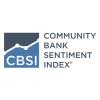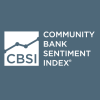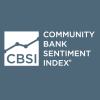Community Banker’s Economic Outlook Hovers Below Neutral
Washington, D.C. - Community banks are slightly more optimistic about future economic conditions, but not enough to move the needle above neutral.
The second quarter 2024 CSBS Community Bank Sentiment Index (CBSI), released today, ticked up merely 1 point to 99 compared to last quarter’s survey, remaining slightly below the neutral level of 100. While four of the seven components improved, regulatory burden, expectations regarding business conditions, and future profitability continued to put downward pressure on the index.
Meanwhile, 75% of community bankers reported they thought the country is in a recession, compared to 66% last quarter.
The results indicate that community bankers would like to have more evidence of economic improvement before pulling sentiment higher, according to CSBS Chief Economist Tom Siems.
“Knowing that monetary policy operates with a lag, the rapid interest rate increases over the past two years are now likely taking more of a toll on consumers and businesses,” Siems said. “Bankers and regulators need to be keenly aware of credit risks that might start to stress banks’ loan portfolios.”
Nearly 300 community bankers from 47 states responded to the CBSI, which surveys community bankers nationwide in the last month of each quarter to capture their thoughts on future economic conditions in seven areas.
An index reading of 100 indicates a neutral sentiment. Anything above 100 indicates a positive sentiment, and anything below 100 indicates a negative sentiment. Quarterly results are included in the Federal Reserve Economic Data, the online database maintained by the Federal Reserve Bank of St. Louis known informally as the FRED.
This is the tenth consecutive quarter where community banker sentiment has been below 100, although the index is up sharply from its all-time low of 73 points one year ago.
At 96, the profitability component had the greatest quarterly improvement, gaining 9 points from the first quarter survey and at its highest level since the end of 2022. In contrast, the franchise value indicator dropped the most, falling 6 points to 130 in the second quarter, but still well above the neutral level of 100.
At 20, the regulatory burden component remains by far the lowest among the seven components and has been below 30 for 14 straight quarters.
The business conditions component fell 3 points to 75 from the previous quarter but is up 32 points from one year ago. Even so, this indicator continues to suggest a weaker economic outlook; like the overall index, the business conditions component has been below 100 for 10 consecutive quarters.
The capital spending component and operations expansion indicator showed small gains from last quarter, reaching their highest levels since the end of 2022. The monetary policy component fell slightly to 100 but is 67 points higher than last year, indicating greater confidence about the impact of monetary policies on the economic outlook.
Community bankers rated the following as their top concerns: government regulation, the federal debt/deficit, cyberattacks, the cost/availability of labor, and inflation.
To learn more about the most recent CBSI, listen to CSBS’s Simply Stated Podcast interview with Chief Economist Tom Siems and read his analysis of the findings in his latest blog post.
Contact: Susanna Barnett, 202-680-3143, [email protected]
X: @CSBSNews
The Conference of State Bank Supervisors (CSBS) is the national organization of financial regulators from all 50 states, American Samoa, District of Columbia, Guam, Puerto Rico, and U.S. Virgin Islands. State regulators supervise 79% of all U.S. banks and a variety of non-depository financial services. CSBS, on behalf of state regulators, also operates the Nationwide Multistate Licensing System to license and register non-depository financial service providers in the mortgage, money services businesses, consumer finance and debt industries.
- Press Releases
Community Bankers on Economy: Sunshine with Some Dark Clouds Emerging
Apr 8, 2025
- Blog post
Can Community Banker Optimism and Greater Economic Uncertainty Coexist?
Apr 8, 2025
- Blog post
Why Are Community Bankers More Optimistic?
Jan 21, 2025
Get Updates
Subscribe to CSBS
Stay up to date with the CSBS newsletter
News to your ears,
New every month.CSBS Podcasts


